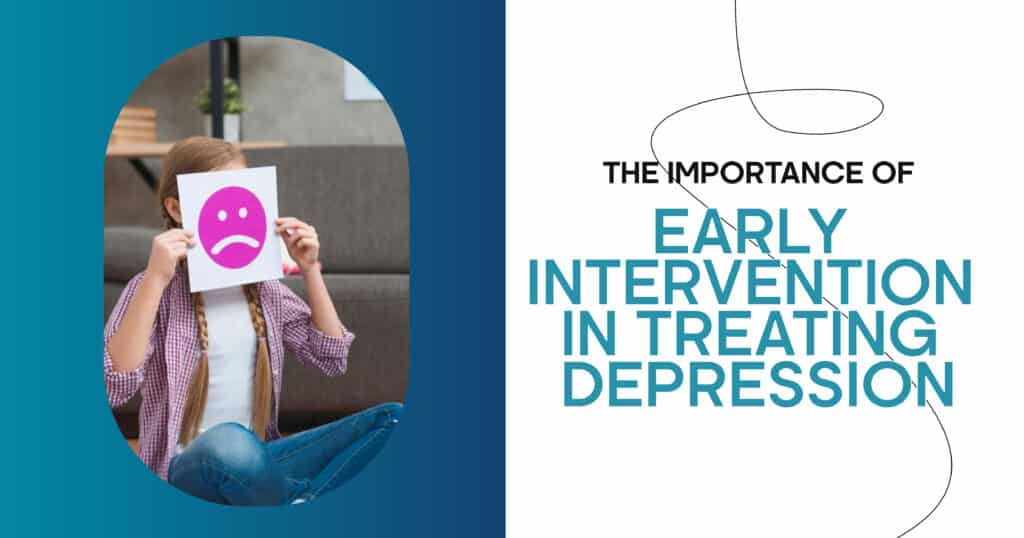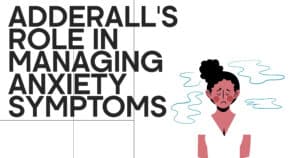Depression is a word we hear often, but its impact can be profound and far-reaching. It’s more than just feeling down or having a bad day—it’s a serious mental health condition that affects millions of people worldwide. One of the most crucial aspects of dealing with depression is recognizing the importance of early intervention.
Essential Takeaways
- Early Intervention Can Make a Difference: Addressing depression early leads to more effective treatment and better overall outcomes.
- Recognizing Symptoms is Key: Identifying the signs of depression in yourself or others is crucial for seeking timely help.
- Seeking Help is a Strength, Not a Weakness: Overcoming barriers and reaching out for support is a positive step towards recovery and improving quality of life.
In this blog post, we’ll explore why catching depression early is so vital, the benefits of timely treatment, and practical steps to seek help. Let’s dive into why early intervention can make a world of difference in managing and overcoming depression.
Understanding Depression and Its Impact
What is Depression?
Depression is more than a fleeting feeling of sadness; it’s a persistent state of emotional, mental, and physical discomfort. Clinically, it’s defined as a mood disorder that significantly impairs daily functioning and can affect anyone, regardless of age or background. It’s characterized by a range of symptoms that can interfere with an individual’s ability to work, sleep, eat, and enjoy life.
Clinical vs. Everyday Sadness: While it’s normal to feel sad or low from time to time, clinical depression, or major depressive disorder (MDD), is a more severe and persistent condition. It’s marked by symptoms lasting for at least two weeks, including a pervasive sense of hopelessness, worthlessness, and a loss of interest in activities once enjoyed.
Common Symptoms of Depression
Depression manifests in various ways, and its symptoms can range from mild to severe. Recognizing these symptoms is the first step toward seeking help. Common signs include:
- Persistent Low Mood: A consistent feeling of sadness or emptiness that doesn’t seem to lift.
- Loss of Interest: A noticeable decrease in interest or pleasure in activities once enjoyed.
- Changes in Sleep Patterns: Difficulty sleeping or sleeping too much.
- Fatigue: A constant feeling of tiredness or lack of energy.
- Appetite Changes: Significant weight loss or gain due to changes in appetite.
- Concentration Issues: Difficulty focusing or making decisions.
- Feelings of Worthlessness: Excessive guilt or feelings of inadequacy.
These symptoms can vary from person to person, but if they persist and interfere with daily life, it’s essential to seek professional help.

The Importance of Early Intervention
Why Early Intervention Matters
Early intervention in treating depression can significantly influence the course of the illness and the overall recovery process. Here’s why it’s so crucial:
Early Treatment Leads to Better Outcomes: Addressing depression early can prevent symptoms from worsening and reduce the risk of developing severe episodes. Early intervention can lead to more effective treatment and a quicker return to normal functioning.
Window of Opportunity: Mental health professionals often refer to the early stages of depression as a “window of opportunity” for treatment. During this time, interventions are more likely to be successful, and individuals are better positioned to make a full recovery.
How Delaying Treatment Affects Recovery
Delaying treatment for depression can have several negative consequences:
Increased Severity: Without intervention, depression can escalate, leading to more severe symptoms and complications. This can result in a longer and more challenging recovery process.
Impact on Daily Life: Untreated depression can affect various aspects of life, including work, relationships, and physical health. It can lead to social withdrawal, decreased productivity, and a reduced quality of life.
Higher Risk of Comorbid Conditions: Prolonged depression increases the risk of developing other health issues, such as anxiety disorders, substance abuse, or chronic medical conditions.

Benefits of Early Treatment for Depression
Improved Treatment Efficacy
One of the most significant benefits of early intervention is the enhanced effectiveness of treatment. When depression is addressed early, the following benefits can be observed:
Timely Use of Effective Treatments: Early intervention allows for the prompt use of therapies and medications that can manage symptoms effectively. This can lead to a more rapid improvement in mood and functioning.
Better Response to Therapy: Individuals who seek help early are often more responsive to therapeutic interventions. This means that treatments like cognitive-behavioral therapy (CBT) or medication can work more efficiently when started early.
Reduced Risk of Severe Episodes
By seeking treatment early, individuals can prevent their depression from becoming more severe:
Preventing Escalation: Early treatment can help manage symptoms before they escalate into more severe forms of depression. This can reduce the likelihood of experiencing intense depressive episodes.
Avoiding Hospitalization: Addressing depression early can decrease the need for hospitalization or more intensive treatments. It can help individuals stay in control of their condition and manage it on an outpatient basis.
Better Quality of Life

Early intervention can significantly improve an individual’s overall quality of life:
Enhanced Daily Functioning: By managing depression early, individuals can maintain their daily routines, engage in activities they enjoy, and improve their relationships.
Improved Overall Well-Being: Early treatment can lead to better emotional and psychological well-being, allowing individuals to experience a more fulfilling and satisfying life.
Recognizing the Signs of Depression
Common Warning Signs
Recognizing the signs of depression is crucial for seeking early intervention. Common warning signs include:
- Persistent Sadness: Feeling sad or empty most of the day, nearly every day.
- Loss of Interest: Losing interest in activities or hobbies once enjoyed.
- Changes in Sleep: Experiencing significant changes in sleep patterns, such as insomnia or oversleeping.
- Appetite Changes: Noticing significant changes in appetite or weight.
- Fatigue: Feeling fatigued or lacking energy, even after rest.
- Difficulty Concentrating: Struggling to concentrate, make decisions, or remember things.
- Self-Criticism: Experiencing feelings of worthlessness or excessive guilt.
How to Identify Depression in Yourself or Others
Identifying depression in yourself or others involves being aware of these symptoms and noticing their impact on daily life:
Self-Assessment: Reflect on your feelings and behaviors. Are you experiencing several symptoms of depression, and are they affecting your daily life?
Observing Others: If you’re concerned about someone else, look for changes in their behavior, mood, and overall functioning. They might be withdrawing from social activities or showing signs of distress.
Practical Steps for Seeking Help
Finding a Mental Health Professional
Finding the right mental health professional is a crucial step in treating depression:
Research and Referrals: Start by researching therapists, counselors, or psychiatrists. Ask for referrals from friends, family, or your primary care doctor.
Specialization and Credentials: Look for professionals who specialize in depression or mood disorders. Check their credentials and experience to ensure they’re well-suited to address your needs.
Initial Consultation: Schedule an initial consultation to discuss your concerns and determine if you feel comfortable with the professional. It’s essential to find someone you trust and feel at ease with.
Exploring Treatment Options
Treatment options for depression can vary based on individual needs:
Therapy: Cognitive-behavioral therapy (CBT) and other therapeutic approaches can help address negative thought patterns and develop coping strategies.
Medication: Antidepressants may be prescribed to help manage symptoms. Discuss potential benefits and side effects with your healthcare provider.
Lifestyle Changes: Incorporating healthy habits, such as regular exercise, a balanced diet, and adequate sleep, can complement professional treatment and improve overall well-being.
Building a Support System
Having a strong support system is essential for managing depression:
Family and Friends: Reach out to loved ones for support and understanding. They can provide encouragement and help you stay motivated in your recovery journey.
Support Groups: Consider joining a support group where you can connect with others who are experiencing similar challenges. Sharing experiences and advice can be beneficial.
Online Resources: Utilize online resources, such as mental health forums and educational websites, to gather information and support.
Overcoming Barriers to Seeking Help
Addressing Stigma and Misconceptions
Stigma surrounding mental health can be a significant barrier to seeking help:
Challenging Myths: Address common myths about depression, such as the belief that it’s a sign of weakness or that people should be able to “snap out of it.” Understanding that depression is a medical condition can help reduce stigma.
Promoting Awareness: Encourage open conversations about mental health to foster a more supportive and understanding environment.
Navigating Financial and Logistical Challenges
Financial and logistical challenges can also impact the decision to seek help:
Insurance and Costs: Explore your insurance coverage and look for low-cost or sliding-scale options if cost is a concern. Many mental health professionals offer reduced rates or payment plans.
Accessibility: Consider teletherapy or online counseling options if transportation or scheduling is an issue. These alternatives can provide convenient access to professional help.
Lessons Learned from Delayed Treatment
Lessons from delayed treatment highlight the importance of seeking help promptly:
Example 1: Lisa struggled with depression for years before seeking help. Her symptoms worsened, leading to a more prolonged and challenging recovery process. Her experience underscores the benefits of addressing depression early.
Example 2: Mark ignored his symptoms and hoped they would improve on their own. By the time he sought help, his depression had become severe, requiring more intensive treatment and a longer recovery period.
Resources and Support
Helpful Organizations and Websites
There are many resources available for those seeking information and support:
- National Alliance on Mental Illness (NAMI): Provides information, support, and resources for individuals with mental health conditions. Visit NAMI
- Mental Health America (MHA): Offers resources and tools for managing mental health and finding help. Visit MHA
- Substance Abuse and Mental Health Services Administration (SAMHSA): Provides a national helpline and resources for mental health and substance abuse treatment. Visit SAMHSA
How to Reach Out for Help
If you or someone you know is struggling with depression, don’t hesitate to reach out for help:
- Crisis Hotlines: Call or text a mental health crisis hotline for immediate support.
- Healthcare Providers: Contact your primary care physician or a mental health professional to discuss treatment options.
- Support Groups: Find local or online support groups to connect with others and share experiences.
Call to Action
Are you or someone you know struggling with depression? Don’t wait to seek help—early intervention can lead to more effective treatment and a brighter future. Contact us today to learn more about available treatment options and how to get started on recovery. Reach out now, and take the first step towards a healthier, happier you.
FAQs
1. What are the early signs of depression?
Early signs include persistent sadness, loss of interest in activities, significant changes in sleep, fatigue, and difficulty concentrating. If these symptoms last more than two weeks, seek professional help.
2. How can I encourage someone to seek help for depression?
Express concern with empathy, provide information on treatment options, and offer to help find a mental health professional. Assure them that seeking help is a strength.
3. What treatments are available for depression?
Common treatments include psychotherapy (e.g., CBT), medication (antidepressants), and lifestyle changes (e.g., exercise). Severe cases might require options like ECT or ketamine therapy.
4. How do I find the right mental health professional?
Look for specialists in depression, check their credentials, and schedule a consultation to ensure you feel comfortable with them. Referrals from trusted sources can also help.
5. What if I can’t afford therapy or medication?
Explore sliding-scale therapy services, community mental health centers, or low-cost clinics. Some medications have patient assistance programs. Discuss your financial situation with your provider for options.







